On March 3, Facebook announced that after four months, it would allow political ads to run on its products again. On November 4, Facebook and Google, the two largest providers of digital political ads, banned political ads in the hope of mitigating the spread of disinformation on their platforms. And while Google also decided to lift its ban on political ads, many of the other major platforms, including Twitter, Spotify, Tik Tok, LinkedIn, Pinterest, and Amazon have maintained the bans on political ads they instituted before the 2020 election. Given the scope of these bans, there remains much we do not know about their impact on political speech and misinformation.
As we set out to research the impact of the platform political ad bans, we quickly realized that there were holes in the available data that made it difficult to assess the policy intervention. In a brief recently published by the Center on Science & Technology Policy at Duke University, we identify three significant impediments to assessing the impact of the recent political ad bans.
First, while campaigns and political organizations are required to report how they spend money to the federal government, they are not required to report how advertising agencies and consultancies spend money on their behalf. We estimate that agencies directed 94% of coordinated spending in the last month of the 2020 general election. This means that for that advertising spending, we lack the granular data that would help us understand how organizations shifted spending in response to the political ad bans.
In addition to complicating analysis, this loophole permits some campaigns and political organizations to hide or launder campaign spending through advertising agencies that are little more than shell companies. It is now common for the biggest campaigns to pass hundreds of millions of dollars through agencies that do not have other clients, making it difficult to track how they are spending money. More worryingly, according to a complaint filed by the Campaign Legal Center, the Trump campaign appears to have illegally hid payments to Trump family members and associates by passing the money through the firms such as American Made Media Consultants.
Second, although federal law mandates that committees and political organizations describe their spending in federal filings, the descriptions are often limited and vague; they’re frequently little more than a single word or short phrase, such as: “media,” “ads,” or “social media ads.” Disbursement descriptions rarely specify if advertising funds were used for ad production, placement, or other services. While there are some regulatory guidelines on descriptions, organizations are largely free to label transactions as they see fit, leaving, for example, Facebook ad purchases to be described as everything from “digital advertising” to “paid media-online,” to “ads.” The lack of detail and standardization makes it difficult for analysts to identify and compare advertising spending across thousands of Federal Election Commission (FEC) entries.
Third, while some platforms maintain archives of the political ads they run, federal law neither requires nor standardizes these archives. As a result, there is wide variation in the data and access provided by existing platform ad libraries. More importantly, initial analyses suggest that campaigns and political organizations are responding to ad bans by turning to alternative platforms that do not maintain ad archives. This, combined with the lack of transparency in ad agency spending, means that we are increasingly unable to see how and where organizations are placing political ads.
These three issues with existing data complicate efforts to assess how committees, political organizations, and ad agencies adjusted ad buys in response to platform ad bans. These disclosure gaps also make it difficult for campaigns and political organizations to develop evidence-based strategies for responding to ad bans in future elections.
To address these gaps and better facilitate analysis of platform ad bans, we make the following four recommendations:
Federal law should require political advertisers to be more transparent
The FEC should amend Advisory Opinion 1983-25 to require political organizations to disclose how ad agencies and consultancies spend money on their behalf. Legislation, such as an amended version of the proposed Honest Ads Act, a bill focused on ad transparency by tech platforms now folded into H.R. 1, could also establish these additional reporting requirements. To mitigate the reporting burden these changes will impose, we recommend that the FEC hold a series of workshops to explore how platforms, advertisers, and the FEC can collaborate to automate disclosures.
The FEC should improve its data disclosures to facilitate political advertising research
The FEC should provide a clear timeline for data release and announce modifications to the archive. It should also establish a limited number of specific spending descriptions and a means of standardizing vendor names across filings.
Platforms should modify political ad libraries to increase transparency
Platforms should standardize data types and variable names in ad databases, improve search functionality, and increase user access by improving public interfaces.
Federal law should require, improve, and standardize platform ad archives
Congress should consider requiring all major types of digital political ad providers to maintain standardized, publicly accessible, and searchable ad databases. It could achieve this result by modifying the Honest Ads Act. Specifically, we recommend that the Honest Ads act be broadened to apply to all digital political ad platforms, that it standardize the data that platform archives supply, and that it require better public access to archives.
Heading into the Georgia run-off election on January 5, we had little understanding of the implications of policy changes by the two biggest providers of digital political ads. Looking toward the 2022 midterms, enacting these four recommendations will significantly improve the data required to understand the impacts that political ad bans have had across political speech. Further understanding of the bans will allow platforms and governments to better tailor future policy interventions meant to reduce misinformation and protect civic life.
Facebook and Google are general, unrestricted donors to the Brookings Institution. The findings, interpretations and conclusions in this piece are solely those of the author and not influenced by any donation.
The Brookings Institution is committed to quality, independence, and impact.
We are supported by a diverse array of funders. In line with our values and policies, each Brookings publication represents the sole views of its author(s).
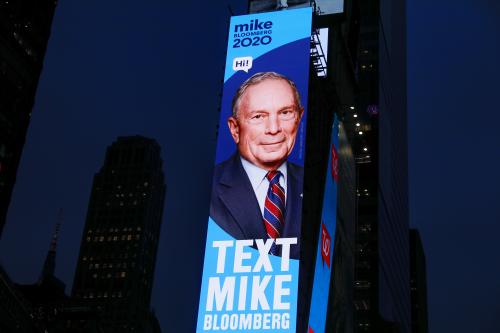
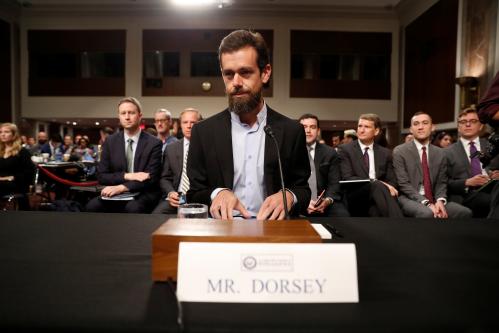



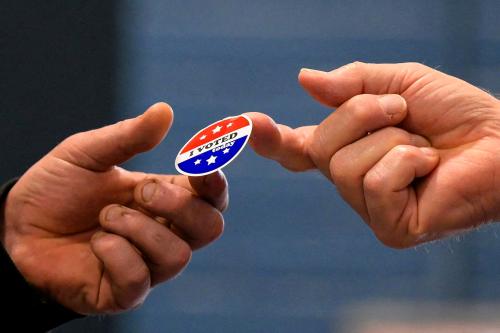
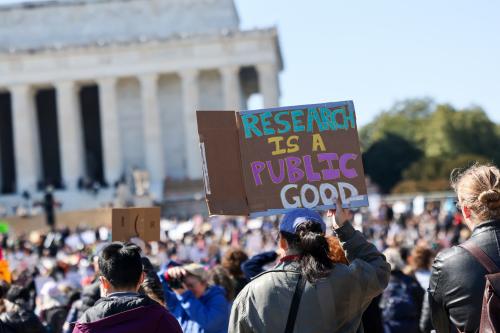
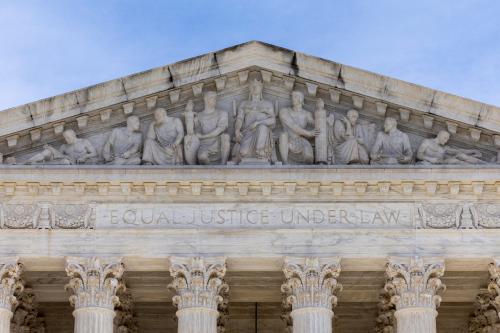
Commentary
How to increase transparency for political ads on social media
March 19, 2021